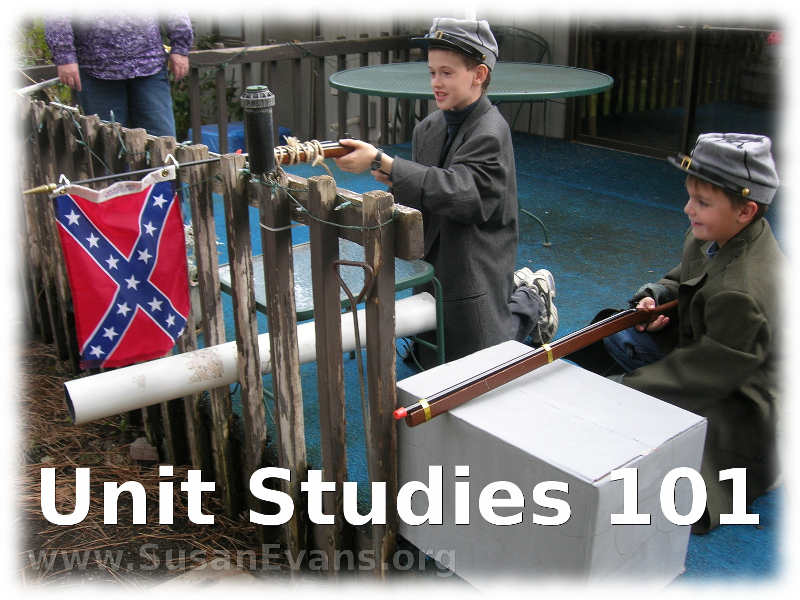Over the next 5 days, I will be giving you a crash course on unit studies in a series called “Unit Studies 101.” By the end of this series, you will understand why I love unit studies so much, and why my students are so far ahead in their content areas of learning. My kids are able to retain their learning with much greater efficiency, and all while having fun and not being rushed!
Here is a preview of what will be coming up this week:
Unit Studies 101
Day 1: What is a Unit Study? (this post)
Day 2: Unit Studies Accommodate All Learning Styles
Day 3: Unit Studies vs. Textbooks
Day 4: Acceleration Through Unit Studies
Day 5: How to Put Together a Unit Study
What is a Unit Study?
A unit study is an educational approach where you integrate all your subjects into one theme. This is ideal for many homeschool families who teach kids of multiple ages, and they want to focus on one time period or topic in science at a time. For example, if you are learning about Ancient Egypt, you tie your history, literature, art projects, writing assignments, and field trips into that time period. Retention is higher when learning is approached this way, and all learning styles are addressed.
A lot of people think that unit studies are something that people add on to an already overloaded curriculum. But no; this is not the case. It replaces the other curriculum except for math and learning how to read and write. You can choose a spine or backbone to your study of history or science if you want (by using a pre-made curriculum), or you can use books from the library alone.
Unit studies simplify your homeschooling significantly. After the kids do math first thing in the morning, you are only doing one theme for the rest of the morning. You don’t feel rushed to splinter the day into tiny bits that are almost schizophrenic. If you have 4 kids, you don’t have to teach 4 different science books. Instead, you go deeply into one topic until you master it, then move on to another topic. You will cover all your sciences in depth way before the kids in the schools. Simple. Deep. Fun.
Where is the Joy in Your Homeschooling?
If you have no joy in your homeschool, you are probably using a method other than unit studies. Unit studies are the most effective, long-lasting, and fun way to teach any topic. Your kids will laugh and have fun while splashing into the theme of the unit. Brothers and sisters aren’t isolated into the solitary confinement of their rooms to do their work separately while yawning. Instead, the whole family does read-alouds and dramatizations of the themes being studied so that relationships between family members are built.
Come back tomorrow to see how a unit study addresses every learning style for your students.
Tags: introduction, unit studies, unit study







I guess in some ways a lot of what I do with my kiddos are unit studies, but it never quite seems like what we do is that for some reason.
Lots of people do unit studies without knowing it because they enjoy splashing into a time period or a science topic, and they do lots of hands-on activities. It’s really a fun way to learn about any topic!
I’ve never heard of Unit Study, interesting concept.
It’s the best way to learn something. If you have a hobby, you read everything you can about it, seek out experts to teach you more, and watch TV shows about it. It’s the same thing with a unit study.
Never heard of such a concept.
But this looks to be the best.
Retention indeed will be a lot.
Nice writing Susan.
If kids can’t retain the information that they are learning for school, what is the point in going through the motions of pretending to learn it? With unit studies, you learn the concept for real.
If I had children, personally I would never home school them. I just think that they would miss out on so much!
They would miss out on bullying, cliques, meaningless worksheets, standing in line, and boring textbooks. Instead, they would be learning so much more deeply, while having plenty of time for family and friends. School children usually have homework, so they have less time for friends than homeschoolers do.
I want to start by saying a big thank you Susan for all the work you have put in to unit studies treasure vault and your blog! Outstanding!!! My heart has been not in our school because we just do the boring workbooks and texts! Life is snuffed out of real learning! Your site brought tears to my eyes cause this is exactly the kind of things I want to do with my kids (8 and 12). We have homeschooled since my oldest was in kindergarten and we have yet to find real joy in learning! God is moving me in a new direction and your site is ever so helpful! Thank you!
Anyway, my question and maybe it is addressed elsewhere, if so, direct me to the place, please!!! But how do you plan? Or do you even plan the unit studies? Do you essentially wing it everyday? Schedule in weekly? What? Just write specific goals to accomplish that week?
Also, I am hearing impaired is there any way you could add captions to your videos? They look marvelous though!!
Again, thanks a bunch for all you do!!!
Planning unit studies is the same as planning anything else you will do. Write a list of what you would like to accomplish each week. I do it one week at a time. I talk about scheduling and planning for unit studies in my workshop “A Schedule that Works.” It’s here: http://susanevans.org/AScheduleThatWorks
As far as subtitles for my videos, the videos that are on YouTube have a corresponding blog post that will tell you what was in the video. Just type in the name of the video into my search box on my blog, and you will find the blog post. As far as the Vault videos, maybe you could have a hearing child write down notes about the video. If you’re hard of hearing but not completely deaf, you could increase the volume of the video. I don’t have enough money to hire someone to do subtitles right now. The other thing is that I show you in the videos how to do each activity, so you can see the motions and figure out the activity based on the visual part of the videos.
Glad you like my site!
Thank you very much!!! I am excited to utilize a lot of your ideas!! Joy and love of learning will be revived again!!!
Hi, I am totally new to unit studies (though we’ve actually done such but not realizing it!), and I have a soon-to-be 7th grader. Unit studies sound like so much fun, but I’m unsure of how to do unit studies at this grade level, when the things they should probably be learning by now doesn’t always cross over. I’m using a curriculum I have, but history and science are totally unrelated, thus I’m having trouble figuring out how to make a unit study that includes both history (France) and science (energy) simultaneously. Any ideas? THANK YOU! Your site is WONDERFUL!
Also, any suggestions on how to develop an independent learning!?
You could either do two different unit studies at the same time, or you could do your France unit study at double speed, followed by the energy unit study at double speed. In other words, when you do one topic for the day, you get a lot more done and finish MORE unit studies than if you do them both simultaneously.
The only exception is high school, where each subject is done, and we still have lots of hands-on activities, but we cover more because they are able to do so. You can cut down on the amount that you do in high school (per year) if you begin high school in 7th grade. That way you can spread out 4 years over 6 years and enjoy high school unit studies without having to do every subject each year.
Independent learning is easy when a kid is interested in a certain topic. Buy the kid a book about it, or an activity kit or whatever, and he or she can do it on their own.
Here is a free one-hour webinar where I talk more about unit studies for older kids: http://susanevans.org/blog/unit-studies-homeschool/
We love Unit Studies! They make it possible to teach multiple grade levels without going crazy!
Exactly!